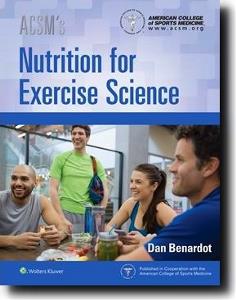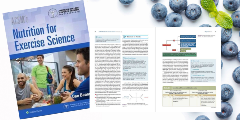Laura J. Kruskall, Ph.D., RDN, CSSD, LD, FACSM, FAND, ACSM-EP |
Sept.
9, 2019

Take Home Points:
1. Exercise professionals should know where to “draw-the-line” when assisting clients with nutrition and diet -related questions and goals.
2. People who engage in the practice of nutrition and dietetics when they are not licensed potentially will face legal consequences.
3. Exercise professionals should provide only general, non-medical nutrition education to clients.
Regulation of Exercise Science Professions and Exercise Professionals
Exercise professionals have more opportunities to discuss nutrition issues with their clients since they see them more regularly than nutrition professionals. It can be confusing about where to “draw-the-line” when assisting clients with nutrition and diet-related questions and goals.
Nutrition and dietetics professionals have one professional organization, the Academy of Nutrition and Dietetics (www.eatright.org) that provides the Registered Dietitian Nutritionist (RDN) credential for practice. On the other hand, there is no single accrediting body for programs in the exercise sciences that results in a uniform nationally recognized credential. Many kinesiology and exercise science degree programs may require one or two nutrition courses or include nutrition content in an existing course. However, this general nutrition overview does not provide the education and training necessary to perform individualized nutrition assessment, counseling and meal planning, especially for those who have health issues.
Each American College of Sports Medicine certification has associated job task analyses (JTA) that serve as the foundation for the exam blueprint (also known as an exam content outline), some related to nutrition. The tasks related to nutrition are knowledge statements not skill statements that encourage or require certified exercise professionals to provide nutrition assessments and interventions. These knowledge statements reflect possible discussion topics that could come up when working with a client or are a topic that the exercise professional could determine requires addressing (e.g., referral to an RDN).
Importance of Working with a Certified Specialist in Sports Dietetics
There are additional board certifications beyond the RDN credential, including the Certified Specialist in Sports Dietetics (CSSD) (scandpg.org/scan/subgroups/sports-performance/be-a-board-certified-sports-dietitian-cssd). Someone with a CSSD has demonstrated training in both exercise and nutrition and possesses specialized expertise in working with athletes and active individuals. When referring a client for nutrition advice, look for someone with a CSSD credential, though an RDN alone is better than no credential.

"When referring a client for nutrition advice, look for someone with a CSSD credential..."
Potential Legal Consequences
Currently, 46 states, the District of Columbia, and Puerto Rico have enacted statutory provisions regulating the practice of nutrition and dietetics either through state licensure or statutory certification (eatrightpro.org/advocacy/licensure/licensure-map). Although statutes vary, many states dictate that it is illegal to engage in the profession of nutrition and dietetics without first obtaining a license. Potential legal consequences of engaging in the practice of nutrition and dietetics when not licensed include the following:
Criminal Charges
- Breaking a state licensure law is a criminal offense, subject to misdemeanor or felony penalties ranging from a cease and desist order to fines and imprisonment.
- Criminal charges can occur for violations of statutes such as state licensing laws.
Civil Claims/Negligence Lawsuits
- The plaintiff (injured party) has to prove that the defendant (exercise professional) had a duty (a certain standard of care to follow), that the defendant breached that duty, and that the breach of duty caused the harm. Exercise professionals have the duty to practice within their scope.
- If an individual is harmed due to any nutrition advice provided by a defendant, he/she can sue the defendant (e.g., the exercise professional and/or employer) for negligence, whether or not the conduct violated a state statute is not the issue. The issue is if the conduct caused the harm.
- Exercise professionals should realize that even seemingly benign advice might lead to harm. If faced with a negligence lawsuit, exercise professionals cannot claim, as a legally-effective defense, that they did not know about the harmful consequences of the nutritional advice they provided. Several viable, legal defenses to refute negligence lawsuits do exist but ignorance (or lack of knowledge) is not one of them.
Establishing Scope of Practice Guidelines and Staff Training
Exercise professionals do not provide “individualized nutritional advice” but only “general, non-medical nutrition education” to clients. An exercise professional can use nutrition information and guidelines published by governmental organizations such as the United States Department of Agriculture (USDA). They may also reinforce individual recommendations provided by an RDN/CSSD.
Once a policy statement is developed by a facility, the procedures related to the policy need to reflect a Scope of Practice (SOP) that is consistent with the law and competencies developed by professional organizations. It is recommended to seek legal counsel in the development, implementation and dissemination of this policy and procedures. The person leading the facility staff training not only needs to describe the written policy and procedures but explain why (from a safety and legal perspective) they have been developed. A training outcome should be that staff members know how to provide “general non-medical nutrition education” when communicating with clients and when referring to an RDN/CSSD. Some fitness facilities have opted to have RDN/CSSDs available who can provide individualized nutritional services for their members/ participants.
Examples of the Practice of Nutrition & Dietetics Versus General Non-Medical Nutrition Information
|
ACTIVITY
|
DEFINITIONS
|
|
Practice of nutrition & dietetics
|
- Nutritional assessment to determine nutritional needs and to recommend appropriate nutritional intake
- Nutritional counseling or education as components of preventive, curative, and restorative health care.
- Development, administration, evaluation, and consultation regarding nutritional care standards.
|
|
General, non- medical nutrition information
|
Providing information on the following:
- principles of good nutrition and food preparation;
- food to be included in the normal daily diet of healthy individuals;
- the essential nutrients needed by the body;
- recommended amounts of the essential nutrients for healthy individuals;
- the actions of nutrients on the body;
- the effects of deficiencies or excesses of nutrients; or
- food and supplements that are good sources of essential nutrients.
|
Working Together
Ideally, RDN/CSSDs and exercise professionals work together as part of a medical, athletic or fitness/wellness team, but the reality is that many exercise professionals and RDN/CSSDs work independently of each other. This lack of interaction, cooperation, and regular communication can contribute to a blurring of the SOP line. It is not until we work closely with other professionals that we can truly understand their professional capacity and how it differs from our own.
Must Read:
For more on this topic be sure to check out the original article published in ACSM’s Health & Fitness Journal®, “DRAWING THE LINE: Understanding the Scope of Practice Among Registered Dietitian Nutritionists and Exercise Professionals”
Author: 
Laura J. Kruskall, Ph.D., RDN, CSSD, LD, FACSM, FAND, ACSM-EP
Dr. Kruskall is an Associate Professor at University of Nevada, Las Vegas (UNLV) and is the Director of the Dietetic Internship & the UNLV Nutrition Center. Her areas of expertise are sports nutrition, weight management and medical nutrition therapy. Her research interests include the effects of nutrition or exercise intervention on body composition and energy metabolism. In addition to her duties at the university, Dr. Kruskall is a member of the Editorial Board for ACSM’s Health & Fitness Journal®, is an ACSM Certified Exercise Physiologist, and is a nutrition consultant for Canyon Ranch Spaclub and Cirque du Soleil in Las Vegas.
Read More Popular Nutrition Content

ACSM's Nutrition for Exercise Science - Resources

Sports Nutrition Myths Busted

10 Things You Need to Know About Sports Nutrition